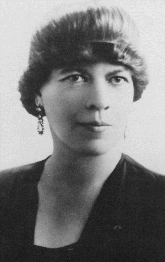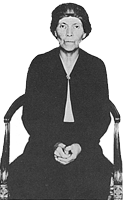The Ivy Compton-Burnett Home Page
Ivy on . . .
everything from
age to wild horses
Interviews
Ivy speaks!
Critics on Ivy Compton-Burnett
Introduction to
Manservant and Maidservant
Originally published in ROUGE, issue No 17, summer 1994. Used by kind permission of the author.
Mistress of the country house
by Robert Cook
One of the first writers to include homosexual characters in her works, Ivy Compton-Burnett dissected Victorian life, above and below stairs. Robert Cook reports
 The Rev'd Jonathan Swift had taken in pupils to augment his income.
'The last of these, Felix Bacon, had remained with him for twenty-two years,
ever since he had arrived in the escort of his father.'
The Rev'd Jonathan Swift had taken in pupils to augment his income.
'The last of these, Felix Bacon, had remained with him for twenty-two years,
ever since he had arrived in the escort of his father.'
The domestic life of this gay clergyman and his boyfriend is touchingly described in Ivy Compton-Burnett's More Women than Men, published in 1933: '"My father has written to me for my birthday," said Felix.... "He congratulates me on completing my fortieth year.".... Felix danced toward Jonathan and took a seat on his knee, the older man moving his arm as if accustomed to the position. "What would your father say, if he knew all about our life together." "I don't think he uses words about everything."
This is only one of a number of homosexual relationships which appear in Compton-Burnett's series of 19 novels published between 1925 and 1971. More Women than Men also shows Jonathan Swift's sister, Josephine Napier, in a lesbian embrace with one of the mistresses in the girls school which she runs. Several of the mistresses have had emotional relationships with each other, although some also enter conventional marriage.
Even earlier, in Pastors and Masters (1925) there were a number of romantic relationships between male characters, 'these dons and people!' as Theresa Fletcher describes those men who do not aspire to marry women. Such relationships are not confined to the upper-middle class characters who dominate the households in most of these novels. There is a life below stairs in which we find such characters as Cook and the housemaid, Ethel, in Elders and Betters (1944).
'If it was hinted that their devotion bordered on the excess, Ethel would reply with quiet finality that they were first cousins.... No one knew Ethel's surname, or knew for certain that Cook had any names. The latter was sensitive on the matter, and flushed when it was broached, and Ethel would interpose with the quiet statement that Cook preferred to be called Cook.'
Ethel addressed Cook in this way even in their personal relationship, which gave some members of the household ground for the belief that their cousinship was of recent origin. When the household moved residence, they contrived to be given a bedroom to share on the grounds that they preferred one large room to two small, and that Cook was of too nervous a type to sleep alone.
 What else characterises
a writer who has been variously compared with Euripides, Jane Austen,
Oscar Wilde (by Angus Wilson), Henry James and
the writers of the roman nouveau in France? Compton-Burnett's novels are nearly all
set in late-Victorian country houses, although written at a later date.
Critics such as Raymond Williams saw the country house novel as reflecting
the settled hierarchical relationships of an agricultural society. As it
survived into the increasingly complex relationships of a capitalist economy,
it gradually disintegrated, fizzling out into some exotic literary forms.
On the one hand Williams found the country weekend whodunit, which needed
a detective to to decipher the transient relationship of the guests. At
the other extreme were the hermetic internalised households of Ivy Compton-Burnett.
These were also full of hidden relationships, illicit liaisons, and illegitimate
children living unacknowledged as servants or mysterious dependants on
the estate.
What else characterises
a writer who has been variously compared with Euripides, Jane Austen,
Oscar Wilde (by Angus Wilson), Henry James and
the writers of the roman nouveau in France? Compton-Burnett's novels are nearly all
set in late-Victorian country houses, although written at a later date.
Critics such as Raymond Williams saw the country house novel as reflecting
the settled hierarchical relationships of an agricultural society. As it
survived into the increasingly complex relationships of a capitalist economy,
it gradually disintegrated, fizzling out into some exotic literary forms.
On the one hand Williams found the country weekend whodunit, which needed
a detective to to decipher the transient relationship of the guests. At
the other extreme were the hermetic internalised households of Ivy Compton-Burnett.
These were also full of hidden relationships, illicit liaisons, and illegitimate
children living unacknowledged as servants or mysterious dependants on
the estate.
The novels were described by their author as 'something between a novel and a play', composed mainly of dialogue — almost entirely so in the later books — and two (A Heritage and Its History and A Family and a Fortune) have been dramatised on the London West End stage. But the dramatic turns of plot occur behind closed doors, rather than in the public rooms of the house in which the families take breakfast or lunch.
The chief subject of the novels is really the family, and the family as hostile environment. This is revealed as the wiser characters strip away the clichés of family life, and as intricate turns of plot reveal the secrets of previously hidden relationships. The attainment of wealth is often a driving force in this, as wills are destroyed and marriages committed in its pursuit. There is even an oblique reference to Engels in Daughters and Sons (1937), where three women characters discuss the nature of the family. The governess cites literary evidence that 'it is based on property.' This prompts Sabine Ponsonby, the matriarch of the household, to observe: 'It must be based on a great deal of property.'
Charles Burkhart, another critic, observes that no moral issue is ever raised about sexuality in the novels — it simply happens. Within the constraints of the family, sex and family ties often converge in incest. In Brothers and Sisters (1929) we find, among numerous pairs of siblings, Sarah and Julian Wake who 'were reputed to be very devoted and very well off, and enjoyed even more prosperity and mutual affection than was said.' Then there are Sophia and Christian Stace who, as well as being brother and sister, have also contrived to be husband and wife. Homosexual incest is no taboo in this environment. In Two Worlds and their Ways (1949) Oliver Firebrace has a romantic relationship with a fellow schoolmaster, Oliver Spode, who also turns out to be his half-uncle.
Ivy Compton-Burnettt was brought up in a large family. Her father, Dr James Compton Burnett, a homeopathic doctor, had five children from his first marriage and six, of whom Ivy was the eldest, from his second. His second wife was something of an emotional tyrant. After her mother's death in 1911, Ivy headed the household until the end of the First World War. During this period, her beloved brother Noel died in the war and two of her sisters were found poisoned in their room, possibly from suicide.
After the war, Compton-Burnett put the past behind her and withdrew from the psychological warfare of the family. She moved to London and then set up home with Margaret Jourdain, an established writer on the decorative arts. She commented on her own life with revealing simplicity in the note which appeared on the cover of some Penguin editions of her novels: 'I have had such an uneventful life that there is little to say. I was educated with my brothers in the country as a child, and later went to Holloway College and took a degree in Classics. I lived with my family when I was quite young, but for most of my life I have had my own flat in London. Margaret Jourdain, my closest friend, lived with me for many years, until her death in 1951.'
Ivy Compton-Burnett was one of the first English novelists to include homosexual characters so freely in her works. This year will see the 25th anniversary of her death on 27 August 1969.
Virago Modern Classics
Two Worlds and Their Ways, ISBN 1
85381 176 9
The Mighty and Their Fall, ISBN 1
85381 177 7
A Heritage and Its History, ISBN 1
85381 281 1
Mother and Son, ISBN 1 85381 291 9
�5.99 each